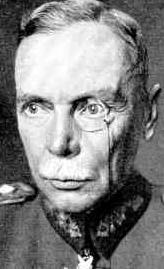Hans von Seeckt
From Kaiserreich
m |
MaskedPickle (Talk | contribs) |
||
| (5 intermediate revisions not shown) | |||
| Line 4: | Line 4: | ||
'''Hans von Seeckt''' (born 22 April 1866) is a German general. Former governor-general of the [[Allgemeine Ostasiatische Gesellschaft]], he is the current chief of the German Großer Generalstab (Great General Staff). | '''Hans von Seeckt''' (born 22 April 1866) is a German general. Former governor-general of the [[Allgemeine Ostasiatische Gesellschaft]], he is the current chief of the German Großer Generalstab (Great General Staff). | ||
| - | + | == Biography == | |
| - | == | + | |
| - | + | ||
Born in Schleswig, he entered the army in 1885 and was seconded into the General Staff. During the [[Weltkrieg]], von Seeckt served in various high-level staff positions on the Eastern Front, including Chief of Staff to [[August von Mackensen]] while the latter commanded the Eleventh Army. | Born in Schleswig, he entered the army in 1885 and was seconded into the General Staff. During the [[Weltkrieg]], von Seeckt served in various high-level staff positions on the Eastern Front, including Chief of Staff to [[August von Mackensen]] while the latter commanded the Eleventh Army. | ||
| - | In | + | In 1926, Chancelor Tirpitz appointed von Seeckt as Commander-in-Chief of all German expeditionary forces during the [[Allgemeine Ostasiatische Gesellschaft#The 1926 Intervention|intervention in China]], while he was serving as governor of German Indochina and supplying the Kuomintang. Serving under him were several famous officers like [[Alexander von Falkenhausen]], [[Gunther Plüschow]] and [[Hellmuth von Mücke]], many of which would stay in China as officers and advisors for the [[Qing Empire]] and the [[Allgemeine Ostasiatische Gesellschaft]]. |
| - | Von Seeckt spend the next seven years as the first German governor-general in China. Not only was he successful in surpressing the various republican resistance groups, and driving the [[Shangqing Tianguo| | + | Von Seeckt spend the next seven years as the first German governor-general in China. Not only was he successful in surpressing the various republican resistance groups, and driving the [[Shangqing Tianguo|Millenarians]] and various warlords into China's interior, he also helped to the reconstitution of the Qing Empire and helped to set up and organise the [[Allgemeine Ostasiatische Gesellschaft]]. |
In 1932 von Seeckt was recalled from China, and returned to Germany. The victorious general received a hero's welcome in Berlin. His Majesty Kaiser [[Wilhelm II]] awarded von Seeckt with the Pour le Mérite medal, and made him a Generalfeldsmarschall of the Reich. | In 1932 von Seeckt was recalled from China, and returned to Germany. The victorious general received a hero's welcome in Berlin. His Majesty Kaiser [[Wilhelm II]] awarded von Seeckt with the Pour le Mérite medal, and made him a Generalfeldsmarschall of the Reich. | ||
Current revision as of 13:09, 25 October 2008
Hans von Seeckt (born 22 April 1866) is a German general. Former governor-general of the Allgemeine Ostasiatische Gesellschaft, he is the current chief of the German Großer Generalstab (Great General Staff).
Biography
Born in Schleswig, he entered the army in 1885 and was seconded into the General Staff. During the Weltkrieg, von Seeckt served in various high-level staff positions on the Eastern Front, including Chief of Staff to August von Mackensen while the latter commanded the Eleventh Army.
In 1926, Chancelor Tirpitz appointed von Seeckt as Commander-in-Chief of all German expeditionary forces during the intervention in China, while he was serving as governor of German Indochina and supplying the Kuomintang. Serving under him were several famous officers like Alexander von Falkenhausen, Gunther Plüschow and Hellmuth von Mücke, many of which would stay in China as officers and advisors for the Qing Empire and the Allgemeine Ostasiatische Gesellschaft.
Von Seeckt spend the next seven years as the first German governor-general in China. Not only was he successful in surpressing the various republican resistance groups, and driving the Millenarians and various warlords into China's interior, he also helped to the reconstitution of the Qing Empire and helped to set up and organise the Allgemeine Ostasiatische Gesellschaft.
In 1932 von Seeckt was recalled from China, and returned to Germany. The victorious general received a hero's welcome in Berlin. His Majesty Kaiser Wilhelm II awarded von Seeckt with the Pour le Mérite medal, and made him a Generalfeldsmarschall of the Reich.
One year later, after Feld Marschall Paul von Hindenburg finally retired as chief of staff, von Seeckt was designated as his sucessor. He is criticized in the inner circles of the army from his refusal of any mechanization of the German army.

